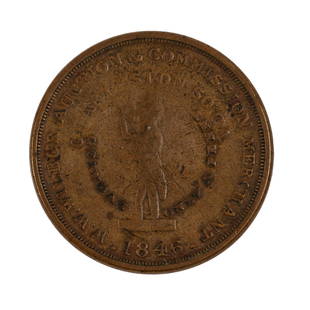
Engraved Steel Printing Plate - John Langdon
Similar Sale History
View More Items in Militaria & War Memorabilia![[CIVIL WAR]. Sixth plate ambrotype of John Singleton Mosby. [Virginia], ca 1865.: [CIVIL WAR]. Sixth plate ambrotype of John Singleton Mosby. [Virginia], ca 1865. Sixth plate ambrotype half portrait featuring John Singleton Mosby seated in a chair. (Some loss of contrast and discol](https://p1.liveauctioneers.com/197/250551/130130021_1_x.jpg?height=310&quality=70&version=1654185975)
Related Militaria & War Memorabilia
More Items in Militaria & War Memorabilia
View MoreRecommended Collectibles
View More



Item Details
Description
Political
New Hampshire Engraved Printing Plate “John Langdon” First President Pro Tempore of the United States Senate
c. 1840-80 (Mid-19th Century), Engraved Steel Printing Plate, Portrait of “John Langdon,” Signer of the United States Constitution, After James Sharples, Sr., Choice Extremely Fine.
This historic, original metal Printing Plate is certainly one-of-a-kind measuring 7" x 10" in polished Steel that remains in near mint condition. Perfectly preserved, it is still perfectly able to use for printing additional images, even today. The engraving itself appears to be After a Pastel, attributed to James Sharples, Sr. (c. 1795), currently in the collection of the Independence National Historical Park. As expected this Plate is etched in mirror image for printing, with his name in facsimile below the central oval portrait image. It is amazing that this rare plate has survived, instead of being melted down & recycled. A remarkable, superb quality original Printing Plate portrait of this historic American patriot and Signer of the United States Constitution.
John Langdon (1741 - 1819) was an important politician from Portsmouth, New Hampshire, being one of the first two United States Senators from that State. Langdon was an early Patriot of the Revolutionary War and served in the Continental Congress for 12 years. Most important, serving as the First President Pro Tempore of the United States Senate on April 6, 1789 under President George Washington. Langdon became Governor of New Hampshire and turned down a nomination for Vice Presidential Candidate in 1812. He later retired until his death in 1819 (see much more on our website).
John Langdon’s father was a prosperous farmer and local politician, whose family had emigrated to America before 1660 from Sheviock, Caradon, Cornwall, and was among the first to settle near the mouth of Piscataqua River, a settlement which became Portsmouth, one of New England's major seaports. Langdon attended the local grammar school, run by a veteran of the 1745 siege against the French at Fortress Louisbourg in Canada. After finishing his primary education, Langdon served an apprenticeship as a clerk. He and his older brother, Woodbury Langdon, rejected the opportunity to join in their father's successful agricultural pursuits, and went to sea instead, apprenticed themselves to local naval merchants.
By age 22, Langdon was captain of a cargo ship called the Andromache, sailing to the West Indies. Four years later he owned his first merchantman, and would continue over time to acquire a small fleet of vessels, engaged in the triangular trade between Portsmouth, the Caribbean, and London. His older brother was even more successful in international trade, and by 1770 both young men were among Portsmouth's wealthiest citizens.
British control of the shipping industries greatly hurt Langdon's business, motivating him to become a vigorous and prominent supporter of the revolutionary movement in the 1770s. He served on the New Hampshire Committee of Correspondence and a nonimportation committee, and also attended various patriot assemblies. In 1774, he participated in the seizure and confiscation of British munitions from Fort William and Mary.
Langdon served as a member of the First Continental Congress from 1775 to 1776. He resigned in June 1776 to become agent for the Continental forces against the British and superintended the construction of several warships including the Raleigh, the America, and the Ranger, which was captained by John Paul Jones. In 1777, he equipped an expedition against the British, participating in the Battle of Bennington and commanding Langdon's Company of Light Horse Volunteers at Saratoga and in Rhode Island. War ended in 1783.
In 1784, he built at Portsmouth the mansion known as the Governor John Langdon House. Langdon was elected to two terms as President of New Hampshire, 1785–86 and 1788-89. He was again a member of the Continental Congress in 1787 and became a delegate to the Constitutional Convention in 1787, serving as a member of the New Hampshire delegation. Langdon was elected to the U.S. Senate and served from March 4, 1789, to March 4, 1801. He was elected the first President pro tempore of the Senate on April 6, 1789, and also served as President pro tempore during the Second Congress.
During the 1787 Constitutional debates in Philadelphia, Langdon spoke out against James Madison's proposed "negative" on State laws simply because he felt that should the Senate be granted this power and not the House of Representatives, it would "hurt the feelings" of House members.
Langdon later served as a member of the New Hampshire Legislature (1801–05), with the last two terms as speaker; he served as governor from 1805–12, with the exception of 1809-10. Langdon declined the nomination to be a candidate for vice president with President Madison in 1812, and later retired. He died in his hometown of Portsmouth in 1819, and was interred at the Langdon Tomb in the North Cemetery.
The town of Langdon, New Hampshire is named after him, as well as Langdon Street in Madison, Wisconsin, a town with several streets named after founding fathers. (From Wikipedia)
It has been written that the history of New Hampshire from the beginning of the Revolutionary War until the beginning of the nineteenth century was little more than the history of John Langdon. While that is an overstatement, few other men were as influential in both state and national politics as was Langdon. On December 14, 1774, he became one of the first prominent Americans to risk hanging when he led the raid on Fort William and Mary. From that day until 1812 when he retired from public life, Langdon remained a dominant political figure.
New Hampshire Engraved Printing Plate “John Langdon” First President Pro Tempore of the United States Senate
c. 1840-80 (Mid-19th Century), Engraved Steel Printing Plate, Portrait of “John Langdon,” Signer of the United States Constitution, After James Sharples, Sr., Choice Extremely Fine.
This historic, original metal Printing Plate is certainly one-of-a-kind measuring 7" x 10" in polished Steel that remains in near mint condition. Perfectly preserved, it is still perfectly able to use for printing additional images, even today. The engraving itself appears to be After a Pastel, attributed to James Sharples, Sr. (c. 1795), currently in the collection of the Independence National Historical Park. As expected this Plate is etched in mirror image for printing, with his name in facsimile below the central oval portrait image. It is amazing that this rare plate has survived, instead of being melted down & recycled. A remarkable, superb quality original Printing Plate portrait of this historic American patriot and Signer of the United States Constitution.
John Langdon (1741 - 1819) was an important politician from Portsmouth, New Hampshire, being one of the first two United States Senators from that State. Langdon was an early Patriot of the Revolutionary War and served in the Continental Congress for 12 years. Most important, serving as the First President Pro Tempore of the United States Senate on April 6, 1789 under President George Washington. Langdon became Governor of New Hampshire and turned down a nomination for Vice Presidential Candidate in 1812. He later retired until his death in 1819 (see much more on our website).
John Langdon’s father was a prosperous farmer and local politician, whose family had emigrated to America before 1660 from Sheviock, Caradon, Cornwall, and was among the first to settle near the mouth of Piscataqua River, a settlement which became Portsmouth, one of New England's major seaports. Langdon attended the local grammar school, run by a veteran of the 1745 siege against the French at Fortress Louisbourg in Canada. After finishing his primary education, Langdon served an apprenticeship as a clerk. He and his older brother, Woodbury Langdon, rejected the opportunity to join in their father's successful agricultural pursuits, and went to sea instead, apprenticed themselves to local naval merchants.
By age 22, Langdon was captain of a cargo ship called the Andromache, sailing to the West Indies. Four years later he owned his first merchantman, and would continue over time to acquire a small fleet of vessels, engaged in the triangular trade between Portsmouth, the Caribbean, and London. His older brother was even more successful in international trade, and by 1770 both young men were among Portsmouth's wealthiest citizens.
British control of the shipping industries greatly hurt Langdon's business, motivating him to become a vigorous and prominent supporter of the revolutionary movement in the 1770s. He served on the New Hampshire Committee of Correspondence and a nonimportation committee, and also attended various patriot assemblies. In 1774, he participated in the seizure and confiscation of British munitions from Fort William and Mary.
Langdon served as a member of the First Continental Congress from 1775 to 1776. He resigned in June 1776 to become agent for the Continental forces against the British and superintended the construction of several warships including the Raleigh, the America, and the Ranger, which was captained by John Paul Jones. In 1777, he equipped an expedition against the British, participating in the Battle of Bennington and commanding Langdon's Company of Light Horse Volunteers at Saratoga and in Rhode Island. War ended in 1783.
In 1784, he built at Portsmouth the mansion known as the Governor John Langdon House. Langdon was elected to two terms as President of New Hampshire, 1785–86 and 1788-89. He was again a member of the Continental Congress in 1787 and became a delegate to the Constitutional Convention in 1787, serving as a member of the New Hampshire delegation. Langdon was elected to the U.S. Senate and served from March 4, 1789, to March 4, 1801. He was elected the first President pro tempore of the Senate on April 6, 1789, and also served as President pro tempore during the Second Congress.
During the 1787 Constitutional debates in Philadelphia, Langdon spoke out against James Madison's proposed "negative" on State laws simply because he felt that should the Senate be granted this power and not the House of Representatives, it would "hurt the feelings" of House members.
Langdon later served as a member of the New Hampshire Legislature (1801–05), with the last two terms as speaker; he served as governor from 1805–12, with the exception of 1809-10. Langdon declined the nomination to be a candidate for vice president with President Madison in 1812, and later retired. He died in his hometown of Portsmouth in 1819, and was interred at the Langdon Tomb in the North Cemetery.
The town of Langdon, New Hampshire is named after him, as well as Langdon Street in Madison, Wisconsin, a town with several streets named after founding fathers. (From Wikipedia)
It has been written that the history of New Hampshire from the beginning of the Revolutionary War until the beginning of the nineteenth century was little more than the history of John Langdon. While that is an overstatement, few other men were as influential in both state and national politics as was Langdon. On December 14, 1774, he became one of the first prominent Americans to risk hanging when he led the raid on Fort William and Mary. From that day until 1812 when he retired from public life, Langdon remained a dominant political figure.
Buyer's Premium
- 23%
Engraved Steel Printing Plate - John Langdon
Estimate $1,500 - $2,000
Shipping & Pickup Options
Item located in Rancho Santa Fe, CA, usSee Policy for Shipping
Payment

TOP






















![Printing plate for John R. Neill Oz illustration: Heading: Author: Neill, John R. Title: Original metal printing plate for the illustration by John R. Neill printed on page 341 of The Patchwork Girl of Oz Place Published: [Chicago] Publisher: D](https://p1.liveauctioneers.com/642/102567/52412683_1_x.jpg?height=310&quality=70&version=1492019432)
![Printing plate of John R. Neill Oz illustration: Heading: Author: Neill, John R. Title: Original metal printing plate for the illustration by John R. Neill printed on page 331 of The Patchwork Girl of Oz Place Published: [Chicago] Publisher: D](https://p1.liveauctioneers.com/642/100299/51162704_1_x.jpg?height=310&quality=70&version=1487355257)









![[Civil War, Ambrotype] ID’d Naval Officer : Exceptional Hand-Painted Naval Ambrotype of Lt. John S. Watson. Quarter plate hand-painted ambrotype. Housed in book-style blue velvet case with flap closure with brass clasp. Modern typed note with i](https://p1.liveauctioneers.com/7226/294713/156486552_1_x.jpg?height=310&quality=70&version=1688306668)







![[Daguerreotype] Revolutionary War & War of 1812 Hero: Quarter plate daguerreotype. Thermoplastic case affixed with a silver plaque engraved "Genl. Mooers, Plattsburgh, NY." c. 1855 daguerreotype of an early painted portrait of General Benjamin Mooers (17](https://p1.liveauctioneers.com/7226/322253/173251484_1_x.jpg?height=310&quality=70&version=1710004847)
















![George Washington Signed Discharge: Partly printed discharge document signed by George Washington, as Commander in Chief of the Armies of the United States. Newburgh, [New York], 4 January 1783. 1 page, ## x ## in. Undersigned by Washin](https://p1.liveauctioneers.com/7226/322253/173251475_1_x.jpg?height=310&quality=70&version=1710004847)
![[Ambrotype] Texas Confederate Soldier: Sixth plate ambrotype. Full leatherette case. Portrait of a possible Texas Confederate soldier. A silver star device was used to pin up the brim of his light-toned headgear, a look often seen in image](https://p1.liveauctioneers.com/7226/322253/173251509_1_x.jpg?height=310&quality=70&version=1710004847)
![Captured Bowie Knife w/ Period Note of Provenance: Captured Confederate D-hilt Bowie knife. [Kenansville, North Carolina]: [Louis Froelich factory]. With original metal and leather sheath with affixed period notes. First note with only remnants. Secon](https://p1.liveauctioneers.com/7226/325455/175169154_1_x.jpg?height=310&quality=70&version=1712370394)
![[Civil War] Bullet Which Nearly Killed Soldier: Lead bullet encased in gold acorn fob with chain. Finely engraved: "W.D. Fiske / 14th Regt. C V / Fredericksburg / Dec 17, 1863." Acorn approx. 1 1/2 x 1 in. Overall length 6 1/2 in. Published in "Her](https://p1.liveauctioneers.com/7226/325455/175169103_1_x.jpg?height=310&quality=70&version=1712370394)
![[CIVIL WAR] 1st Texas Infantry in Camp: Outdoor half plate ambrotype of the 1st Texas Infantry. Full leatherette case. Significant, large half plate ambrotype of members of the 1st Texas Infantry at ‘Splinterville,’ the regiment’s win](https://p1.liveauctioneers.com/7226/322253/173251512_1_x.jpg?height=310&quality=70&version=1710004847)
![[HANCOCK, John] Washington’s Spy, Officer’s Commission: Partly printed document signed by John Hancock as President of the Continental Congress, for Epaphras Bull (1748-1781). [Philadelphia, Pennsylvania], 10 January 1777. 1 page, ## x ## in. Completed in](https://p1.liveauctioneers.com/7226/322253/173251471_1_x.jpg?height=310&quality=70&version=1710004847)
![[CIVIL WAR] Black Soldier & Wife: CDV-sized tintype photograph WITH gem-sized tintype. Full thermoplastic case. Portrait of an unknown African American Civil War soldier who holds the rank of sergeant. He looks directly at the camera](https://p1.liveauctioneers.com/7226/322253/173251671_1_x.jpg?height=310&quality=70&version=1710004847)
![Historic Einstein Signed Program from Lincoln University Visit: Conferences on Objectives. Lincoln University, [Oxford], Pennsylvania, 3 May 1946. SIGNED BY ALBERT EINSTEIN. Tipped into Horace Mann Bond (1904-1972). The Education of the Negro in the American Socia](https://p1.liveauctioneers.com/7226/322253/173251693_1_x.jpg?height=310&quality=70&version=1710004847)


![[CIVIL WAR] Presented Ames Sword, 16th New York Light Artillery : Fine m1850 foot officer's sword presented to Lieutenant Henry C. Jackson, 27th New York Infantry and 16th New York Light Artillery. Solingen, [Germany]: W. Clauberg and Ames, Chicopee MA hallmarks. Re](https://p1.liveauctioneers.com/7226/325455/175169097_1_x.jpg?height=310&quality=70&version=1712370394)









